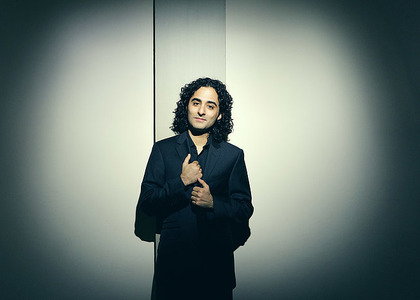> [Archived] Interviews

Interview with conductor Kerem Hasan
British musician Kerem Hasan will conduct the National Radio Orchestra's concert on Friday, the 15th of March 2024. The conductor settled in for a conversation with Ana Sireteanu:
Kerem Hasan, this is the second time you're coming to conduct the Romanian National Radio Orchestra. How did the first rehearsals go?
It's a pleasure to be back here in Bucharest and to work on this absolutely marvellous, yet challenging, program.
How would you describe your relationship with the orchestra?
This is the second time I'm working with this orchestra; I recall that last year we had a wonderful collaboration, when we were working on something very different from this week's repertoire. I'm glad to be back here and to work with these musicians who offer a very virtuosic interpretation of this program. So, I'm looking forward to the concert!
You've just had the first rehearsal with violinist Ioana Cristina Goicea. What are your first impressions about your collaboration with her?
Ioana is an incredible violinist! She makes one of the most difficult violin concertos sound very natural. She plays the violin with such incredible ease; she has a beautiful tone, and from a conductor's perspective, she is an ideal soloist to work with.
How do you find the exchange of musical ideas with soloists of various backgrounds?
It's always a fascinating experience to work with different soloists because each reacts differently, each has their own interpretation and ideas, and my job is to listen and understand the soloist's opinions about the piece since it's primarily their concert. It's a collaboration, but ultimately, they are the soloists. So, of course, I bring up my own ideas, but I believe it's essential to respect their opinions in the first place.
In your opinion, what are the challenges the orchestra has to face during Bartok's Violin Concerto No. 2?
Bartok's Violin Concerto No 2. is incredibly difficult, very demanding technically. Bartok's score is very precise; the composer clearly notes what he wants from the orchestra in terms of the agogic stress and the interaction with the soloist, and these things are indeed very challenging to be achieved and require a lot of time to be mastered.
How would you describe Sergei Rachmaninoff's Symphony No. 3 and the orchestration of this work?
Rachmaninoff's Symphony No. 3 is undoubtedly a masterpiece, even though it's not as well-known as his Symphony No. 2. But just like in this latter mentioned work, Rachmaninoff is equally brilliant in orchestration and melodic structures. Rachmaninoff writes these melodies so naturally and effortlessly that it's truly a pleasure to delve into this music accompanied by the orchestra.
As part of your training to become a conductor, you attended rehearsals at the Royal Opera House in London. What are the characteristics of conducting opera?
Opera is an entirely different "animal" from the symphonic repertoire. Regarding opera, of course, there are different priorities; the singers on stage require a different type of attention from the conductor. I need to know whether at that moment the orchestra is accompanying or leading the soloists. Also, we, as conductors, need to be very aware of what's happening on stage, the dramatic moment we're in, and what we - conductors and musicians in the pit - play at those moments should be interpreted in accordance with what's happening on stage.
So, I believe conducting an opera requires a different set of skills. Another aspect is that an opera lasts much longer, both for rehearsals and for the performance itself. Usually, an opera production requires about a month of rehearsals, and this changes the way we approach rehearsals because we're talking about a longer working time. But everything is just as enjoyable, just very different.
After having had the experience of being in the final of the Donatella Flick Conducting Competition, you stated that a competition is a necessary evil in the lives of young conductors, an experience that brings recognition. Do you think there's another way to gain recognition as a young conductor?
Yes, certainly. Participating in competitions isn't the only way to build a career as a conductor; I believe there are many other ways. These often involve working with more experienced conductors, being their assistant, and having the opportunity to learn as much as possible about how they work with a very good orchestra. It's all part of the experience of assisting a master conductor. Usually, this is the best way for young conductors to develop their skills in conducting an orchestral ensemble. I think this process usually takes a little more time, and the difficulty that participating in a competition raises is that if you succeed in a competition, you must be prepared to immediately build a career on top of that success. So you have to be ready to win a competition, and I believe that's quite challenging.
As a final request, please offer our audience an invitation to the concert.
I wholeheartedly invite everyone in Bucharest to come to our spectacular concert, featuring Bartok's Violin Concerto No. 2, performed by the exceptional soloist Ioana Cristina Goicea, followed by the beautiful Symphony No. 3 by Sergei Rachmaninoff.
Translated by Marian-Cătălin Niculăescu,
University of Bucharest, Faculty of Foreign Languages and Literatures, MTTLC, year I
Corrected by Silvia Petrescu














